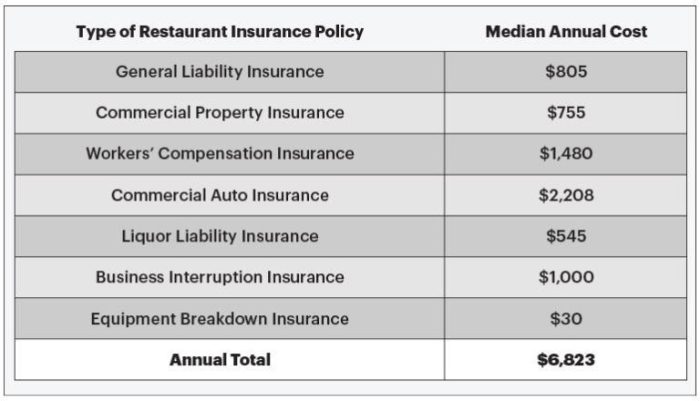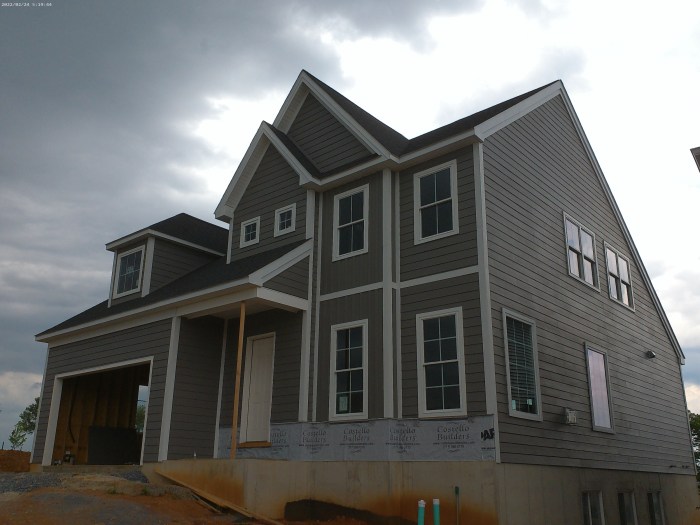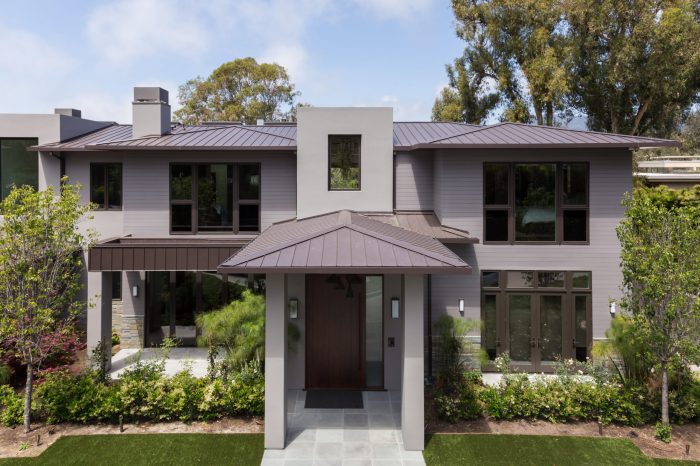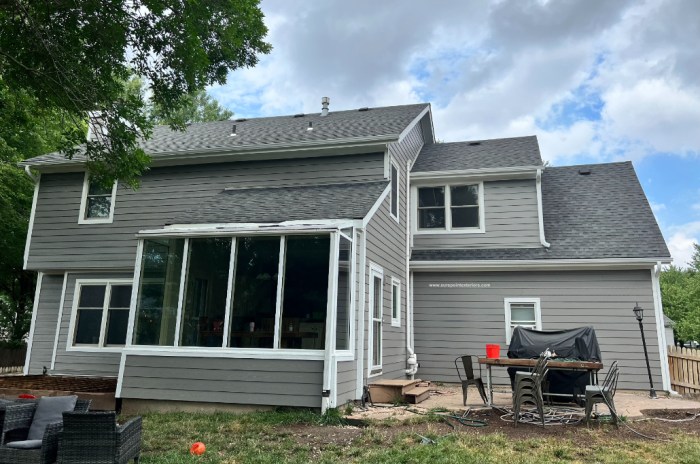Restaurant Insurance Quotes: What You Need to Know Before Opening
Delving into the realm of Restaurant Insurance Quotes: What You Need to Know Before Opening, this introductory segment aims to captivate readers with a wealth of essential information presented in a manner that is both informative and engaging.
The subsequent paragraph will offer a detailed overview of the topic at hand, setting the stage for a comprehensive discussion.
Understanding Restaurant Insurance
Restaurant insurance is crucial for protecting your business from unexpected events that could potentially lead to financial loss or even closure. By having the right insurance coverage in place, you can safeguard your restaurant's assets, employees, and customers.
Types of Insurance Coverage for Restaurants
- General Liability Insurance: Covers costs related to third-party bodily injuries, property damage, and advertising injuries.
- Property Insurance: Protects your restaurant's building, equipment, and inventory from damages caused by fire, vandalism, or theft.
- Workers' Compensation Insurance: Provides coverage for employees who are injured on the job, including medical expenses and lost wages.
- Business Interruption Insurance: Helps cover lost income and operating expenses if your restaurant is forced to close temporarily due to a covered event.
Examples of Incidents Covered by Restaurant Insurance
- If a customer slips and falls in your restaurant, general liability insurance can help cover their medical expenses and legal fees.
- If a fire breaks out in your kitchen and damages your equipment, property insurance can help cover the cost of repairs or replacement.
- If one of your employees sustains a work-related injury, workers' compensation insurance can provide coverage for their medical treatment and lost wages.
Factors Influencing Insurance Quotes
When it comes to obtaining insurance quotes for your restaurant, there are several key factors that can significantly impact the rates you are quoted. Understanding these factors is essential to making informed decisions regarding your restaurant insurance needs.
Location
The location of your restaurant plays a crucial role in determining your insurance rates. Restaurants located in high-crime areas or regions prone to natural disasters may face higher insurance premiums due to the increased risk of theft, vandalism, or property damage.
On the other hand, restaurants situated in safer neighborhoods with lower crime rates may enjoy more affordable insurance rates.
Restaurant Size and Scope of Operations
The size and scope of your restaurant operations also influence insurance costs. Larger restaurants with more extensive facilities, equipment, and staff may require higher coverage limits, leading to higher insurance premiums. Additionally, the type of cuisine you serve, the presence of alcohol service, and the use of specialized equipment can impact your insurance rates.
It is essential to accurately assess the size and scale of your restaurant operations to ensure you have adequate coverage while managing insurance costs effectively.
How to Obtain Insurance Quotes
When opening a restaurant, obtaining insurance quotes is a crucial step to protect your business from unforeseen risks and liabilities. Here's how you can go about getting insurance quotes for your restaurant:
Information Needed to Request Accurate Insurance Quotes
- Business Details: Provide information about your restaurant, including the type of cuisine, size of the establishment, location, and number of employees.
- Insurance Coverage Needed: Specify the type of insurance coverage you are looking for, such as general liability, property insurance, workers' compensation, or commercial auto insurance.
- Previous Insurance History: If your restaurant has had insurance coverage before, provide details of your claims history and any existing policies.
- Revenue and Sales Projections: Insurance providers may require information on your restaurant's revenue and sales projections to assess the level of coverage needed.
Importance of Comparing Quotes from Multiple Insurance Providers
- Cost-Effectiveness: By comparing quotes from different insurance providers, you can find the most cost-effective option that offers the coverage you need.
- Coverage Discrepancies: Not all insurance policies are the same, so comparing quotes allows you to identify any discrepancies in coverage and make an informed decision.
- Customer Service: Evaluating quotes from multiple providers gives you a chance to assess their customer service and responsiveness to your inquiries.
- Tailored Solutions: Different insurance providers may offer tailored solutions that better suit the specific needs of your restaurant business.
Customizing Insurance Coverage

When it comes to restaurant insurance, one size does not fit all. Restaurant owners have the option to customize their insurance coverage to suit their specific needs. By tailoring their policies, they can ensure they are adequately protected against the unique risks they face in the restaurant industry.
Optional Coverage Add-Ons
- Food Contamination Insurance: This coverage can help protect your restaurant in case of a foodborne illness outbreak or contamination that leads to financial losses.
- Liquor Liability Insurance: If your restaurant serves alcohol, this coverage can protect you from liabilities related to alcohol-related incidents, such as fights or accidents involving intoxicated patrons.
- Equipment Breakdown Insurance: This coverage can help cover the cost of repairing or replacing essential equipment like refrigerators, ovens, or HVAC systems in case of a breakdown.
Benefits of Tailoring Insurance Policies
- Cost-Effective: By customizing your insurance coverage, you can avoid paying for unnecessary coverage while ensuring you have adequate protection for your specific risks.
- Comprehensive Protection: Tailoring your policy allows you to address all the unique risks your restaurant faces, giving you peace of mind knowing you are covered in case of unforeseen events.
- Flexibility: Customizing your insurance coverage gives you the flexibility to adjust your policy as your restaurant grows or changes, ensuring you always have the right level of protection.
Cost Management Strategies
Managing insurance costs is essential for restaurant owners to ensure financial stability and protect their business from unexpected expenses. By implementing effective cost management strategies, you can reduce insurance premiums without compromising coverage and negotiate better rates with insurance providers.
Risk Assessment and Mitigation
Before seeking insurance coverage, conduct a thorough risk assessment to identify potential hazards and liabilities specific to your restaurant. By implementing risk mitigation measures such as staff training, proper equipment maintenance, and safety protocols, you can reduce the likelihood of accidents and claims, leading to lower insurance premiums.
Bundle Policies
Consider bundling your restaurant insurance policies with a single provider to take advantage of discounts and lower rates. By consolidating your coverage for property, liability, workers' compensation, and other insurance needs, you can potentially save on premiums and simplify the insurance management process.
Review Coverage Regularly
Regularly review your insurance coverage to ensure it aligns with your restaurant's current needs and operations. By adjusting coverage limits, deductibles, and policy endorsements based on changes in your business, you can optimize your insurance costs and avoid paying for unnecessary coverage.
Compare Quotes from Multiple Providers
Obtain insurance quotes from multiple providers and compare the coverage options, rates, and discounts offered. By shopping around and negotiating with different insurers, you can leverage competitive pricing and potentially secure lower premiums for your restaurant insurance policies.
Legal Requirements and Compliance
When opening a restaurant, it is crucial to understand the legal requirements related to insurance to ensure compliance with regulations. Failure to meet these obligations can have significant impacts on insurance coverage and costs, potentially leading to legal consequences for restaurant owners.
Legal Requirements for Restaurant Insurance
- Restaurant owners are typically required to have certain types of insurance coverage, such as general liability insurance, workers' compensation insurance, and property insurance.
- Insurance requirements may vary depending on the location of the restaurant and local regulations.
- Compliance with health and safety regulations is essential to maintain insurance coverage, as violations can result in coverage denial or increased premiums.
Impact of Compliance on Insurance Coverage and Costs
- Meeting legal requirements and maintaining compliance with regulations can help restaurant owners secure adequate insurance coverage at reasonable costs.
- Non-compliance with regulations can lead to gaps in coverage, leaving the restaurant vulnerable to financial losses in case of accidents or lawsuits.
- Insurance premiums may increase significantly for restaurants that have a history of non-compliance or frequent claims.
Consequences of Non-Compliance
- Failure to meet insurance-related legal obligations can result in fines, penalties, or even the closure of the restaurant.
- In the event of a claim, insurance companies may deny coverage if the restaurant is found to be in violation of regulations or operating without the required insurance.
- Legal action from injured parties or employees can lead to costly lawsuits that the restaurant owner may have to pay out of pocket without insurance coverage.
Last Point
Concluding our exploration of Restaurant Insurance Quotes: What You Need to Know Before Opening, this final section will provide a succinct summary encapsulating the key points discussed, leaving readers with a lasting impression of the importance of insurance in the restaurant industry.
Query Resolution
What factors influence insurance quotes for restaurants?
Insurance quotes for restaurants can be influenced by various factors such as location, size of the restaurant, scope of operations, and the specific coverage needed. Insurers consider these factors when determining the cost of insurance for a restaurant.
How can restaurant owners customize their insurance coverage?
Restaurant owners can customize their insurance coverage by adding optional coverage add-ons that cater to their specific needs. By tailoring the insurance policy to address unique risks in the restaurant industry, owners can ensure comprehensive coverage.
What are some cost management strategies for restaurant owners to reduce insurance premiums?
Restaurant owners can effectively manage insurance costs by implementing strategies such as risk management practices, negotiating with insurance providers for better rates, and exploring ways to reduce premiums without compromising coverage.




